Ants in the Kitchen: How To Get Rid of Them
Ants Control
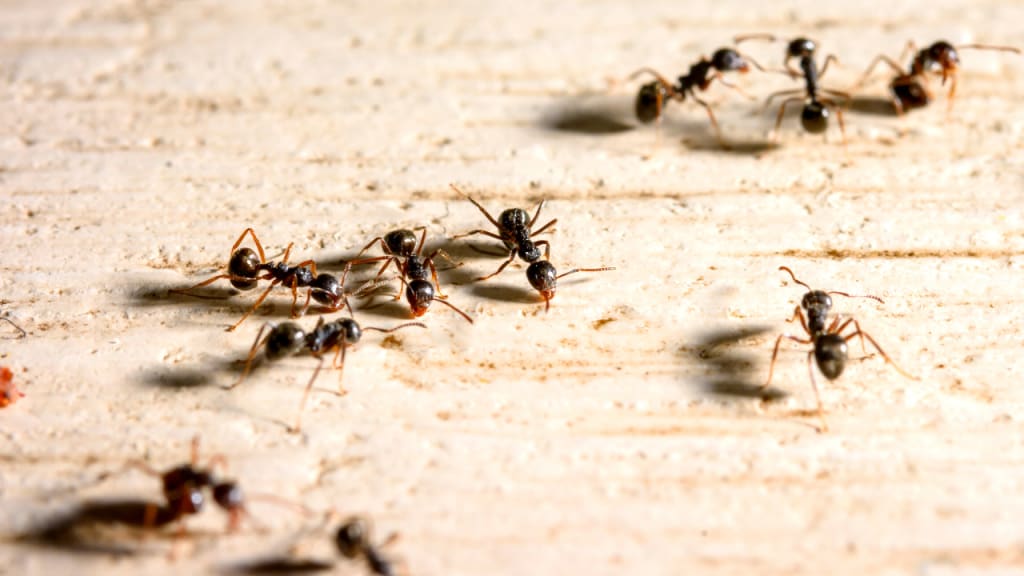
The solution isn't to kill one ant in the kitchen: there's normally a colony nearby when there's one ant, and each ant leaves a trail of chemicals called pheromones that attract other ants in the area.
Until you exterminate the ant colony where the egg-laying queen lives, she'll keep reproducing and sending more worker ants into your home to feast on your kitchen counters, sinks, and cupboards.
Are Ants Dangerous to Humans?
There are more than 12.000 species of ants. The majority of these ants are completely harmless to humans.
However, ants can carry bacteria, making them potential disease or illness carriers.
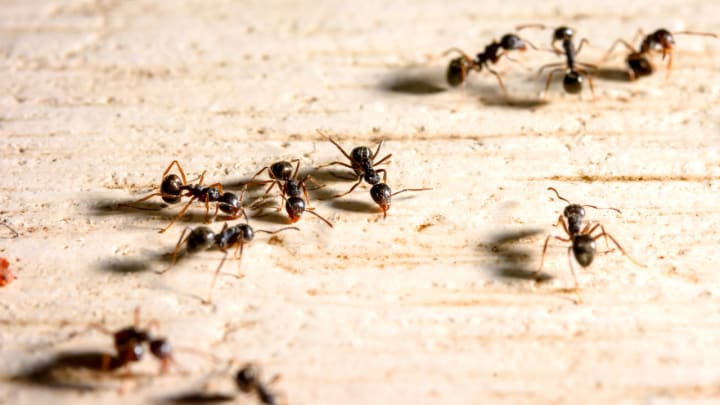
A tiny animal study published in 2019 found that Monomorium ants can carry pathogenic bacteria that can be harmful to humans.
The pharaoh ant, a form of Monomorium ant, may be a cause of bronchial asthma and respiratory allergies, according to an older 2005 study by Trusted Source.
Get Rid of Ants in Your Kitchen Permanently
Determine the Point Of Entry
For a few minutes, watch the ants in the kitchen to see where they're coming from: fissures in the floor, crumbled caulk along a windowsill, a damaged window screen, or small holes within a kitchen cabinet against an outside wall.
In your ant elimination attempts, you'll target the entry point, so don't sell it just yet.
Locate the Nest
Wait for the ants to return with their crumbs to the source, and then observe where they proceed after leaving the kitchen.
Following their movements may bring you directly to the nest, where the remainder of the colony resides.
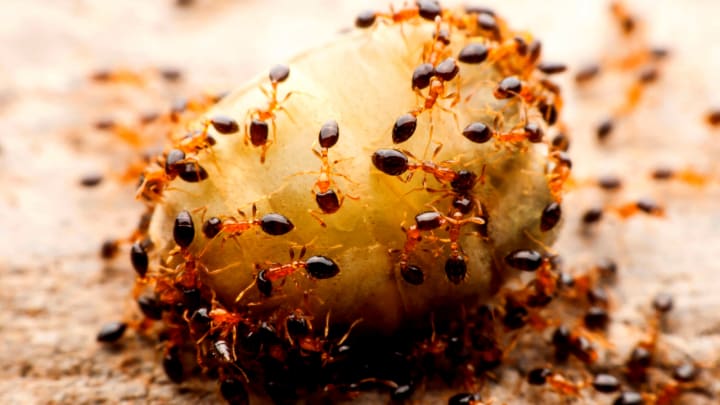
The nest may be located outdoors (e.g., on the ground, in a tree) or indoors (e.g., in a moisture-damaged wall or cabinet void) and will typically resemble a mound of debris or a pile of decaying leaves.
Directly Destroy the Nest
If you find the nest outside, use an outdoor non-repellent insecticide to destroy it. Non-repellent insecticides, unlike repellents, do not discourage insects and cause the colony to disperse and reorganize elsewhere. In other words, ants can pass through this type of insecticide unconscious that they have been poisoned.
Pour a half-gallon of boiling water over the ant nest to collapse it and kill the ants.
If the nest is in an indoor structure, such as a wall void, use a plastic squeeze bottle to spray a very thin layer of boric acid powder directly over the nest to kill the ants inside.
While the white powder comprised of Boron and water is fatal to ants, it is a low-toxicity substance for people. Any leftover powder should be kept out of reach of children and dogs.
Then, using a vacuum with a hose attachment, remove the actual nest from the wall void, and immediately dispose of the vacuum dust collector bag outside.
Reapply boric acid to the empty gap, and use joint compound to repair any damage to the wall.
Kill the Colony With Traps
If you can't find the ant nest or don't want to destroy it, use a store-bought ant trap or a DIY ant trap fashioned from a small, sealed plastic container filled with one teaspoon of borax and quarter-cup corn syrup to kill the colony.
Place the trap as close as possible to the ants' access point into the kitchen so they can discover the bait fast.
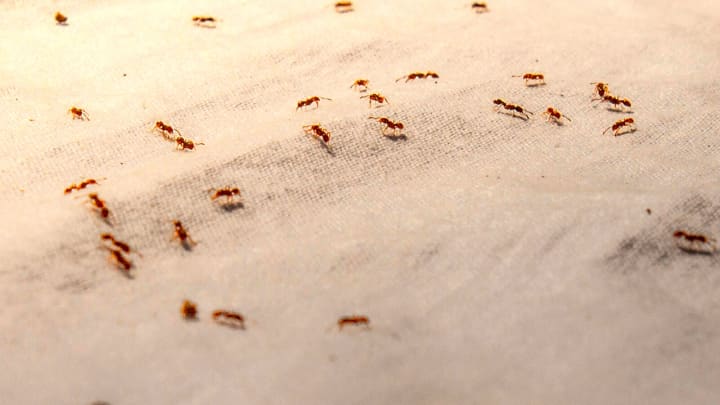
Once the worker ants have entered the traps, they will transport the poisonous bait back to their colony to feed the queen and her young, effectively killing the colony over a few days.
Remove any other food sources from the vicinity of the ant traps so that there are no distractions.
Remove Any Leftover Ants
After you've exterminated the colony, you might find a stray ant on your kitchen counters.
To dehydrate and kill these ants, sprinkle a little amount of food-grade diatomaceous earth in their path.
Alternatively, immobilize the ants by spraying them with a soapy solution (one tablespoon dish detergent and 12 ounces plain water), then wiping them away with a paper towel.
Close the Entrance
To prevent additional ant colonies from invading your kitchen in the future, seal the access site you detected earlier.
Joint compound is suitable for sealing minor drywall voids, whereas caulk is suitable for repairing cracks around windows or doors.
Stop the Kitchen Ants From Returning
Food Storage is Critical
Ants will love your pantry as a playground. That's why the most efficient way to get rid of them is to avoid having to deal with them in the first place.
Take preventative precautions by storing foods in your pantry in reusable, sealed containers so they can't reach the source. Keep in mind that ants aren't simply attracted to human foods; pet food is also a big draw.
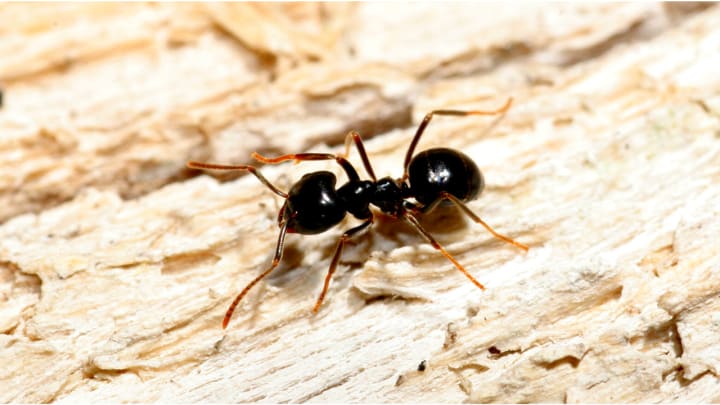
Remove the dog and cat food from the package and place it in an airtight container. Make sure the space around the pet bowl is also clean. This will help avoid major rodent and cockroach infestations in your kitchen, in addition to ant infestations.
To avoid a swarm of these pests, store ripe fruits in the refrigerator rather than leaving them out on the kitchen counter.
Moisture Should Be Avoided
Keep in mind that ants enter your home in the hopes of finding riches in the form of refuge, food, and water.
Ants don't require a lot of water to survive when it comes to receiving their H2O. Even a damp dishcloth or kitchen mat will suffice to keep them running. Put your dish towel and mat near a fan in your kitchen to help them dry faster, or toss them in the dryer for a few minutes.
Also, look for and fix any faulty pipes that may be attracting ants. To be extra safe, place a cup over the drain in your kitchen sink to prevent them from coming up or hanging out in the area.
Make sure there's no standing water around your houseplants.
Make Your Kitchen Sparkle
Your kitchen is an ant feast with unlimited food. Taking away the ants' food source is the first step in getting rid of ants in the kitchen.
After you've dealt with your intruders, you'll need to sterilize your kitchen and make sure you stay on top of it.
Use Smells That Are Naturally Repellent
Ants, like many other insects, use their sense of smell to locate their next meal. Instead of reaching for harsh and potentially dangerous deadly sprays and traps, certain smells will suffice.
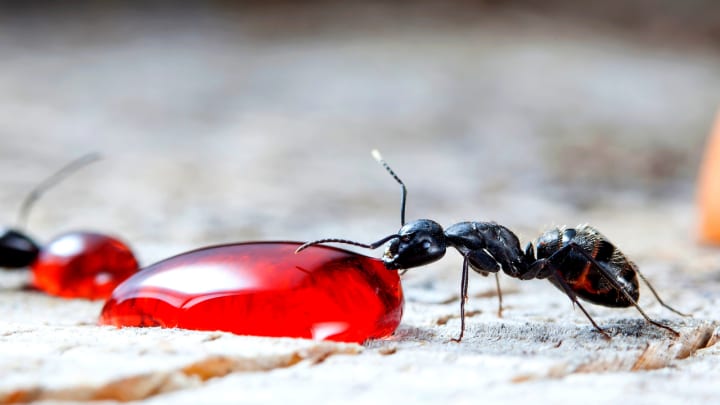
Ants will be deterred by the scents of peppermint oil, lemon, and cinnamon. Spray diluted essential oils around your kitchen, or sprinkle cinnamon where ants have been detected.
The household spice serves as a dermal irritant, keeping them at bay. Using coffee grinds and/or cayenne pepper as a deterrent is also useful.
Make Minor Home Improvements
Caulking small holes, repairing broken window and door screens, and replacing any rotten wood surrounding entry points are all good ways to keep ants and other pests out of the kitchen.
Add Lemon And Orange Scent To Everything
It may be difficult to believe, but lemon and orange can help you get rid of ants.
Simply squeeze some lemon or orange juice where ants are most likely to enter your kitchen, or you can also place the peels of these fruits in the ant's typical path, or put some lemon or orange juice in a mop and clean the kitchen floor with it.
This will leave a lemony odor on the floor, as well as a bitter taste, which ants dislike.
Sprinkle Some Pepper
Black pepper is something that almost everyone has in their pantry. It works as both a bug repellant and a food enhancer.
Sprinkling pepper in locations where ants are likely to be found is an easy technique to get rid of kitchen ants.
Pepper has a pungent odor that ants despise. This is a fantastic alternative because it is safe for both pets and children, so you can use it everywhere.
Use borax
Making a borax combination that can destroy the entire ant colony and keep them from returning is an extremely effective technique to permanently eliminate kitchen ants.
When you kill ants on the surface, their colony, which can create new ants to replace those who were killed, isn't targeted, so they can come back. Because the borax mixture does not kill the ants right away, they return to their colony and share it with their family.
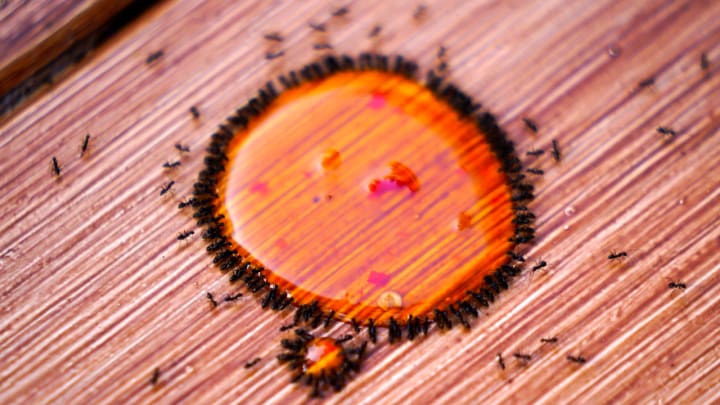
The poison can take anywhere from 24 to 48 hours to take action. Because all ants, including those in their egg forms, consume the borax mixture, this scenario kills the whole colony.
To prepare the borax mix
1 part sugar, 1 part borax, and 2 parts water are mixed together.
To boost water retention and prevent water from evaporating too quickly, soak cotton balls in the sugar-borax combination. Wait for the poison to take effect after placing the borax-soaked cotton balls on an ant trail.
Conclusion
Please let us know your experience and your opinions about our post on how to get rid of kitchen ants.
Thanks for reading!






Comments
There are no comments for this story
Be the first to respond and start the conversation.